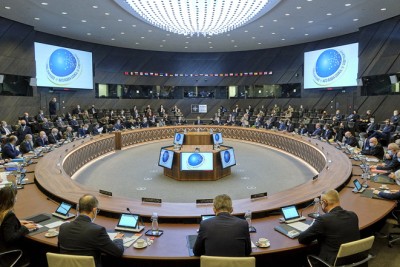NATO and EU Military Committee Meet Regarding Western Balkans
A joint meeting of the NATO Military Committee and the European Union Military Committee was held to discuss the current security situation in the Western Balkans as well as the EU's ongoing Operation Althea. In the context of the Russian military aggression on Ukraine, stability in the Balkans increases in importance.
 The NATO and EU Military Committee met in a joint format to discuss Western Balkans. / Picture: © NATO North Atlantic Treaty Organization
The NATO and EU Military Committee met in a joint format to discuss Western Balkans. / Picture: © NATO North Atlantic Treaty Organization
The Russian invasion of Ukraine opened up new issues regarding stability in the Western Balkans.
For Russia, it is important to strengthen its influence in the Balkans.
Western sanctions against Russia, particularly against the energy sector, will cripple Russia's economy, making it all the more important for Russian foreign policy to acquire new leverage.
When Europe finds a way to get energy independence from Russia, Russia will be left without any leverage and bare hands.
Chancellor Nehammer has also stressed the importance of stability in the Balkans on several occasions.
So also at the EU summit recently in which he emphasized that: "There is a fear that the Russian Federation will start destabilizing here as well. We need measures here to ensure that the Western Balkans do not become a sphere of influence of the Russian Federation or other major powers such as the People's Republic of China."
Besides, many important European dignitaries had visited the Western Balkans, as well as Bosnia and Herzegovina. Among others EU High Representative for Foreign Affairs and Security Policy and Vice President of the European Commission, Josep Borell, Foreign Minister of the Federal Republic of Germany, Annalena Baerbock, and Austrian Chancellor Nehammer, visited the Balkans.
All of them stressed the importance of stability in the Balkans and the need to prevent the strengthening of Russian or Chinese influence as Vindobona.org reported.
Especially now, in the course of the war in Ukraine, Russia will try to spread propaganda and fake news.
In Bosnia and Herzegovina, in Serbia, even elections are coming soon. It should be important for the West, for the EU, to find a way to present itself as a democratic solution and the right way into the future. This is the only way to contain an expansion of Russian or Chinese influence in Europe.
According to the Tirana Times, "Russia wages a hybrid war on the Balkans."
In this hybrid war, Russia uses its energy supply and propaganda against NATO and the west to seize influence in the Balkans. For example, Srbijagas and Naftna Industrija Srbije (NIS) are majority-owned by Gazprom and Rosneft, two Russian state energy giants. As the Tirana Times describes this: "Serbia has become a state of energy insecurity, whereas it is well known that energy security is critically important to overall security and stability in each country."
A joint approach from the west can help to stabilize the Western Balkans and to curb Russian and Chinese influence. Without a credible European and Euro-Atlantic perspective for the Western Balkans, malicious third-party influence is more likely to occur, creating uncertainty and suspicion in the region, reducing citizens' trust in the EU.
Now the NATO and the EU Military Committee met to discuss the most important issues concerning the security policy in the Balkans. In times of crisis, NATO-EU cooperation and coordination are crucial in the Western Balkans.
General Claudio Graziano, Chairman of the EU Military Committee, and the NATO and EU Military Representatives were welcomed to the meeting by Lieutenant General Lance Landrum, Deputy Chair of the NATO Military Committee.
Lieutenant General Lance Landrum stressed that “our continued cooperation is essential to achieving substantial and sustained progress, not only in Bosnia and Herzegovina, but throughout the Western Balkans, but also to protect and promote freedom, democracy and our common values.”
The EU and the NATO alliance cooperate in the EUFOR Altheas mission and ensure security and peace in Bosnia and Herzegovina. In the framework of a package of agreements known as "Berlin Plus," the Alliance provides the planning, logistical, and command support for the EU mission. Through these agreements, NATO and the EU cooperate in many ways.
A strong EU Presence allows the EU to help create the conditions for achieving the long-term political goal of a stable, viable, peaceful, and multi-ethnic Bosnia and Herzegovina that cooperates peacefully with its neighbors and is irreversibly on the path to EU membership as reported by Vindobona.org.
Conclusion
- The Kremlin’s undertakings are aimed at drawing Serbia away from Western institutions, however, the Serbs are its only ally in the region.
- The Kremlin sees further processes of NATO and EU enlargement to the Western Balkans as a potential threat, hoping to keep the region away from these Western structures.
- The Kremlin destabilizes the region by sustaining "frozen conflicts" and escalating tensions, which is nourished by economic policy, propaganda and disinformation tools while using pro-Russian milieus to perform subversive activities.
- The Kremlin will thus strive to undermine peaceful agreements reached back in the 1990s through the joint efforts of the West. They all designated border delimitation, outlining both the model of Bosnia and Herzegovina as agreed upon in Dayton and Kosovo’s independence.
- The Kremlin is now involved in carrying out hybrid warfare against pro-Western authorities in Montenegro, Macedonia, and Kosovo while its support for Bosnia’s Serb separatists poses a threat to state structures.



